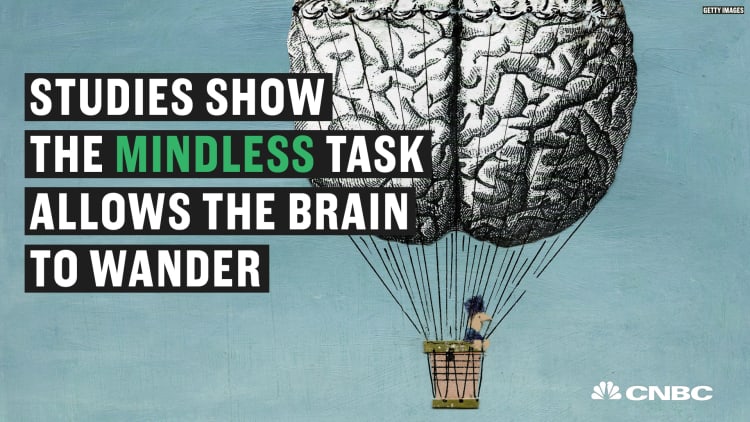During college, students spend about four years stressing over assignments, deadlines and adapting to new environments. As they prepare to enter the workforce, the pressure to meet academic expectations gets replaced with high career expectations and the stress continues.
Although a constant state of stress has become the new norm for many working adults, the physical and mental toll is crippling their chances at success, esteemed workplace and happiness experts Annie McKee and Emma Seppälä argue in their research.
"Most of us work more than eight hours a day," McKee writes in her latest book "How To Be Happy At Work" based on decades of working with Fortune 500 companies. "That means that if we are unhappy at work, we are miserable from more than a third of our lives."
McKee notes that "slow-burning stress, anger and other negative emotions can literally kill us."
"Some people face the reality of their unhappy work situation only as a result of a heart attack, a broken relationship, or a tragedy. Don't wait that long," she writes.
Based on McKee and Seppälä's research, here are the ways stress affects your body and the measures you can take to prevent or decrease the harmful results of working too hard.
Why you're probably feeling so stressed at work
People today live by the "faulty theory" that in order to succeed, "you need to continually be getting things done and moving on to the next goal as quickly as possible," Seppälä, a Stanford psychologist and science director of Stanford's Center For Compassion and Altruism Research, notes in "The Happiness Track."
This is further perpetuated because "work addiction is rewarded by our culture," she adds, "and [is] therefore considered a good thing despite its long-term negative impact on well-being.
Providing historical context, McKee notes that "as societies industrialized, the notion that work should be painful grew and spread as workers lost autonomy, the joy of seeing the fruits of their labors and even fresh air."
Today, McKee writes, "we live in a world where overwork is overvalued," thanks to constantly changing company structure, the burden of needing to do more with fewer resources, longer work days and the advancement of technology.
"Overly competitive colleagues, too little time for what needs to get done and poor leadership are just three of the many problems that can cause constant stress at work, which in turn causes physical, mental and emotional problems," McKee writes.
This is ultimately not a sustainable way to live.
The physical, psychological and social effects of chronic stress
It's important to note that stress is normal and does have its benefits. McKee and Seppälä both define "good stress" as a product of our human fight-or-flight response, "where our bodies prepare to fight off a potentially deadly attack or run away," as Seppälä writes.
Here are the physical responses that occur as a result of our brains communicating a threat to our nervous system, according to McKee:
- Our muscles become tense
- Our hearts beat faster take consume more oxygen and nutrients
- Our bronchial airwaves expand
- Our pupils dilate to see more around us
- Our cognitive processing briefly enhances so we can think faster
"These responses are helpful when we're facing real dangers such as a physical attack or a natural disaster," McKee writes. But here's the catch: "Unfortunately, our brains don't do a very good job of distinguishing this type of serious danger from the kinds of pressures and threats we experience at work."
Seppälä notes that stress in small doses can help us achieve short-term goals, which may resonate with plenty of procrastinators.
But over time, "chronic stress" or feeling stressed all the time, "is the number one enemy of success," Seppälä adds.
While this is by no means an exhaustive list, effects of chronic stress, also known as long-term acute stress, include:
- Proneness to illness and chronic infections
- High blood pressure
- Heart problems
- Increased susceptibility to diabetes and cancer
- Gastrointestinal issues
- Muscular and skeletal problems
- Restlessness throughout the day and night
- Substance abuse
Chronic stress also has the ability to interfere with social well-being and spread to your co-workers, friends and family,
"Anxious emotions such as fear are physiologically contagious through pheromones, chemicals released in our sweat," Seppälä writes. "When someone emits 'fear pheromones,' the people who come into contact with that person show greater activation in brain areas corresponding to anxiety and fear (particularly the amygdala)."
And if you have found yourself working more to avoid your stress, McKee notes that can also be a dangerous coping mechanism.
"It makes things worse as we ignore our relationships, cut out fun and eat and sleep poorly. Working like this doesn't help us get more done, it does just the opposite," McKee writes. "We are too tired and worn out to do our jobs well. Our resources are depleted."
What you can do to beat stress
Getting to a happier, less stressed place in life does not have to be difficult. However, it's important to note that you can't just talk yourself out of stress or tough it out and resort to distractions.
Here are two steps McKee and Seppälä offer:
- Determine the source of your stress. If you are stressed from working too much, McKee recommends you ask yourself if you really need to work that hard or if it's only out of habit and question if you are overworking as an escape from another part of your life.
- Learn how to be resilient. Seppälä defines resilience as the "ability to quickly bounce back from the stressful situations you face every day."
If a situation at work has made you feel stressed, Seppälä recommends countering your body's automatic tendency to be negative, worry and overthink by taking deep breaths. Breathing is a "rapid and reliable pathway into your nervous system dedicated to helping you regain your optimal state." It not only calms you down, Seppälä writes, but it also normalizes your level of cortisol, also known as the "stress hormone."
Another way Seppälä recommends to quickly bounce back from stress is to engage in slow-paced activities like yoga or going for walks in nature (or if you live in a city, a tree-lined street or park).
"Since not all stress is bad, the trick is to harness the benefits of short-term stress while not falling prey to chronic stress," Seppälä notes. "Sustainable long-term success is not about burning the candle at both ends, it's about learning to skillfully surf the stress wave."
Like this story? Like CNBC Make It on Facebook.
Don't miss:
Harvard researchers say this mental shift will help you live a longer, healthier life
Stanford psychologist gives 4 science-backed ways to beat stress and stay happy over the holidays
Video by Richard Washington




